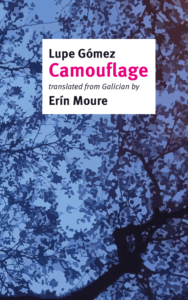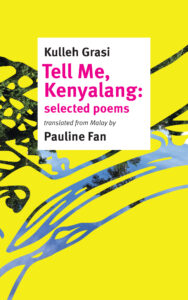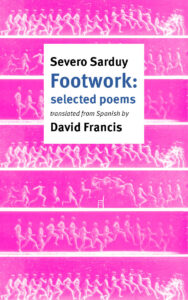Mediathek
Circumference Books
Circumference Books is an American press for poetry in translation. It supports the creative and urgent work of bridging cultures.
Our books highlight the process of translation and how that work is rooted in collaboration. Each multi-lingual project foregrounds original design solutions, making visual the relationships between languages, writers, translators, and communties. We support the creative and urgent work of bridging cultures, and we spotlight non-national languages.
circumferencebooks.com
CAMOUFLAGE by Lupe Gómez
translated from Galician by Erín Moure
Camouflage is a sharp, tender elegy for a mother and for a rural village, its changing walks and ways and words. In Camouflage, we see how one person can be “two sisters,” with “two pasts.” We learn about making cheeses, but also that “Death is a political project.” Gómez’s bold voice erases the line between the political and the domestic, the experimental and the sequential, and allows for celebratory insight.
Camouflage was originally written in Galician, a language spoken by almost 3 million people, primarily in Galicia, an “autonomous community” in the northwest of Spain. Translator and poet Erín Moure has translated the book into an intimate English with a vivid and tight “linguistic embrace.”

TELL ME KENYALANG by Kulleh Grasi
translated from Malay and Iban by Pauline Fan
This groundbreaking book is one of a handful of contemporary works of poetry written in Malay to be translated into English and the first in decades to include Malaysian indigenous languages. The original poems move between Malay and seven indigenous languages, including Iban, Bidayuh, and Kayan. Translator Pauline Fan brings the work into a thrilling, living English.
Kulleh Grasi’s poems are entirely new and yet intimate. They are entwined with myth and nature and yet are fully post-modern. They are outside the context of Western poetry and also deeply inside the questions and experiences Western poets are grappling with today: questions of identity in relation to nation and language and sexuality. Grasi, both a known poet and rock star in Malaysia, writes new rivers and islands into the landscape of identity.

FOOTWORK by SEVERO SARDUY
translated from Spanish by David Francis
Cuban writer Severo Sarduy was one of the most groundbreaking Latin American literary figures of the 20th-Century. Gabriel García Márquez called him the best writer in the Spanish language. Sarduy was born in Cuba in 1937 and died due to AIDS in 1993.
Sarduy’s poetry is often homoerotic and imbued with allusions to art, the decaying body, science, jazz and folk music, and the author’s Spanish, African, and Chinese heritage. Roland Barthes’s praise of one of Sarduy’s novels applies to his poetry: “the pledge of continuous jubilation, the moment when by its very excess verbal pleasure chokes and reels into bliss.”
David Francis serves as Dean of Grace Hopper College at Yale University, where he teaches in the Program on Ethnicity, Race, and Migration.
